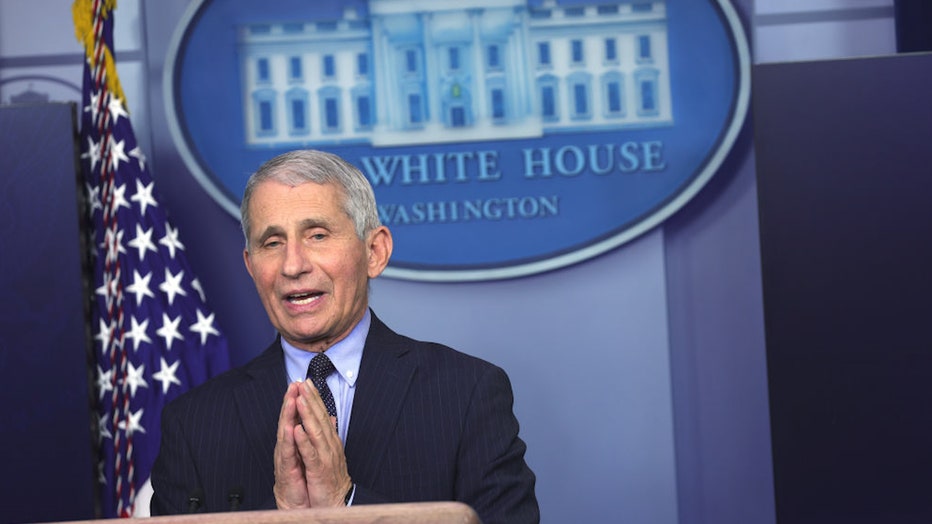Fauci says CDC working on guidelines for small gatherings among fully vaccinated people
During a Monday virtual press briefing, Dr. Anthony Fauci said small gatherings at home without masks are "low risk" as long as the people present have received both doses of their COVID-19 vaccine.
The longtime director of the National Institute of Allergy and Infectious Diseases said that guidelines for gatherings among fully vaccinated individuals from the U.S. Centers for Disease Control and Prevention are forthcoming, but he suggested that socializing may be possible for people who have had both shots.
"What happens if you get doubly vaccinated people with the Pfizer and Moderna for example, members of family, people coming in, like I use the example of a daughter coming in from out of town who is doubly vaccinated and husband and wife doubly vaccinated and maybe a next door neighbor who you know are doubly vaccinated. Small gatherings in the home of people, I think you can clearly feel that the risk, the relative risk, is so low that you would not have to wear a mask, that you could have a good social gathering within the home," Fauci said.
"Beyond that is going to be based on a combination of data, a combination of modeling, and a combination of good clinical common sense. And the CDC is working on that right now and we’ll all be together with a good message, hopefully soon," Fauci said.

FILE - Dr Anthony Fauci, Director of the National Institute of Allergy and Infectious Diseases, speaks during a White House press briefing.
RELATED: 4th at-home COVID-19 test gets emergency use authorization from FDA
While Dr. Rochelle Walensky, director of the Centers for Disease Control and Prevention, agreed with what Fauci said, she pointed out that cases are still increasing.
"I want to really keep our eye on the fact that our cases are increasing right now, slightly. The goal is not to sort of open up travel, open up all things because we’re scaling up vaccinations. The goal in these first 100 days has always been to make sure we are in a place to be out of this pandemic," Walensky stressed.
Walensky said that updated guidelines for small gatherings and social gatherings for people who have received both of their vaccinations would be shared on the CDC’s website, but did not say when.
RELATED: Johnson & Johnson promises 100 million vaccine doses by June
With the U.S. vaccination drive picking up speed, states eager to reopen for business are easing coronavirus restrictions despite warnings from health experts that the outbreak is far from over and that moving too quickly could prolong the misery.
"At 70,000 cases per day, we’re not in that place right now. So while we may have guidance at the individual level, like Dr. Fauci has suggested, I think we all need to keep our eye on the fact that we’re not out of the woods here, yet," Walensky said.
The push to reopen comes as COVID-19 vaccine shipments to the states are ramping up. Nearly 20% of the nation’s adults — or over 50 million people — have received at least one dose of vaccine, and 10% have been fully inoculated 2 1/2 months into the campaign to snuff out the virus, according to the CDC.
RELATED: US' demand for COVID-19 tests plummets, which may leave country exposed
Johnson & Johnson shipped out nearly 4 million doses of its newly authorized, one-shot COVID-19 vaccine Sunday night to be delivered to states for use starting on Tuesday. The company will deliver about 16 million more doses by the end of March and a total of 100 million by the end of June.
That adds to the supply being distributed by Pfizer and Moderna and should help the nation amass enough doses by midsummer to vaccinate all adults. The White House is encouraging Americans to take the first dose available to them, regardless of manufacturer.
Overall, the outbreak has killed more than 500,000 Americans.
RELATED: US begins distribution of single-dose Johnson & Johnson COVID-19 vaccine
The vaccine already is contributing to a decrease in severe cases and deaths among older people, and is "quickly becoming a bigger contributor" nationally, Justin Lessler, an expert in infectious diseases at Johns Hopkins University, said in an email.
"I suspect we will see it overtake natural infection as the biggest driver of immunity late spring earliest, more likely midsummer," Lessler said.
The Associated Press contributed to this report.

